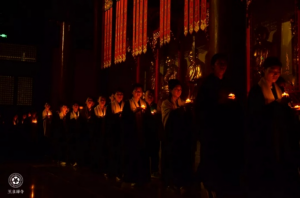
We learn from the Pathamanatha Sutta, AN 10.17, that a monk in training to become skilled in practicing the Dhamma must find a wise and compassionate teacher from whom to gain instructions on the 10 protections, because without such basic guidelines a trainee may easily lose mindful awareness and, as a result, be bothered by unnecessary sufferings.
So what are these 10 qualitiesthat may serve a monk as protections in Dhamma practice? Below I have paraphrased the words of the Buddha in the Protection Sutta, which may be easier to digest than a strict word-for-word translation of the ancient text.
First, when a bhikkhu remains virtuous and lives following the guidelines of the Patimokkha—behaving with good conduct, residing in right refuge, remaining safe from bad influences, seeing danger even in the minutest of faults, knowing not only the practice rules but abiding by and training in them—this is a quality that serves as a protection from unnecessary suffering.
Second, when a bhikkhu has studied and carefully retained what he has learned, so that his understanding of the Dhamma grows and deepens—such teachings that perfectly explain the complete spiritual life; such teachings that the monk needs to have learned well, retained in mind, investigated mentally, and understood deeply—this is a quality that serves as a protection from unnecessary suffering.
Third, when a bhikkhu has good friends around him and good comrades close to him—good companions in the Dhamma—this, too, is a quality that serves as a protection from unnecessary suffering.
Fourth, when a bhikkhu is easy to train, possesses qualities that make him easy to admonish, is patient and receives instruction respectfully, this is a quality that serves as a protection from unnecessary suffering.
Fifth, when a bhikkhu is skillful and diligent in attending to the spectrum of duties to be done for benefit of his fellow monks, who possesses sound judgment about how to carry out such duties properly, this is a quality that serves as a protection from unnecessary suffering.
Sixth, when a bhikkhu who loves the Dhamma, is pleasing in his way of speaking, and is filled with a lofty joy in understanding and practicing the Dhamma, this is a quality that serves as a protection from unnecessary suffering.
Seventh, when a bhikkhu has aroused energy for abandoning unwholesome qualities and for acquiring wholesome qualities, is strong and firm in exertion, and does not shirking the duty of cultivating wholesome qualities, this is a quality that serves as a protection from unnecessary suffering.
Eighth, when a bhikkhu is content with any kind of robe, with any kind of alms food, with any kind of lodging and medicine or provision for the sick, this is a quality that serves as a protection from unnecessary suffering.
Ninth, when a bhikkhu possesses supreme mindfulness and alertness, can remember and recollect what was done and said long ago, this is a quality that serves as a protection from unnecessary suffering.
Tenth, a bhikkhu who is wise and possesses the wisdom that discerns arising and passing away, that is noble and penetrating, and that leads to the complete destruction of suffering, this, too, is a quality that serves as a protection from unnecessary suffering.
Bhikkhus live under a protector, not without a protector. One without a protector lives in suffering. These are the 10 qualities of protection.
In short, in order to stay safe on the path:
First one must know the Patimokkha, following the moral guidelines as practiced within the sangha, being ever vigilant and mindful.
Second, one needs to concentrate carefully and be enduring in the practice, continually cultivating and developing a deeper sense of the Dhamma.
Third, one reaps the benefits of having good friends and good companions in the Dhamma, which is beneficial for development.
Fourth, one is easy to train, one is patient, and receives instruction respectfully and humbly in the cultivation of the Dhamma.
Fifth, one is skillful and diligent in attending to the spectrum of chores and duties to be done for the benefit of one’s fellow monks. One shows sound judgment in carrying out such duties for the benefit of the community.
Sixth, one loves the Dhamma, has a pleasant way of speaking, and is filled with a feeling of joy dependent on a deep understanding of the Dhamma.
Seventh, one has aroused the energy necessary for abandoning unwholesome qualities, for acquiring wholesome qualities, and is firm in exertion, embracing the duty of cultivating wholesome qualities.
Eighth, one is content with any kind of robe, with any kind of alms food, with one’s lodging, medicine or any provision when sick.
Ninth, one possesses supreme mindfulness and alertness, and can remember and recollect what was done and said long ago.
Tenth, one possesses a wisdom that discerns the emptiness of arising and passing away, that is noble and penetrating, and that leads the mind to the destruction of suffering
When one has the benefit of the above protections, they help in the cultivation and development of the Dhamma and serve as a protection from unnecessary suffering.
See more
Paṭhamanāthasutta—Bhikkhu Sujato (Sutta Central)
Paṭhamanāthasutta—Bhikkhu Bodhi (Sutta Central)
Related features from BDG
Food for the Mind
Sixteen Poisons Polluting the Mind
Fire Imagery in the Pali Canon














